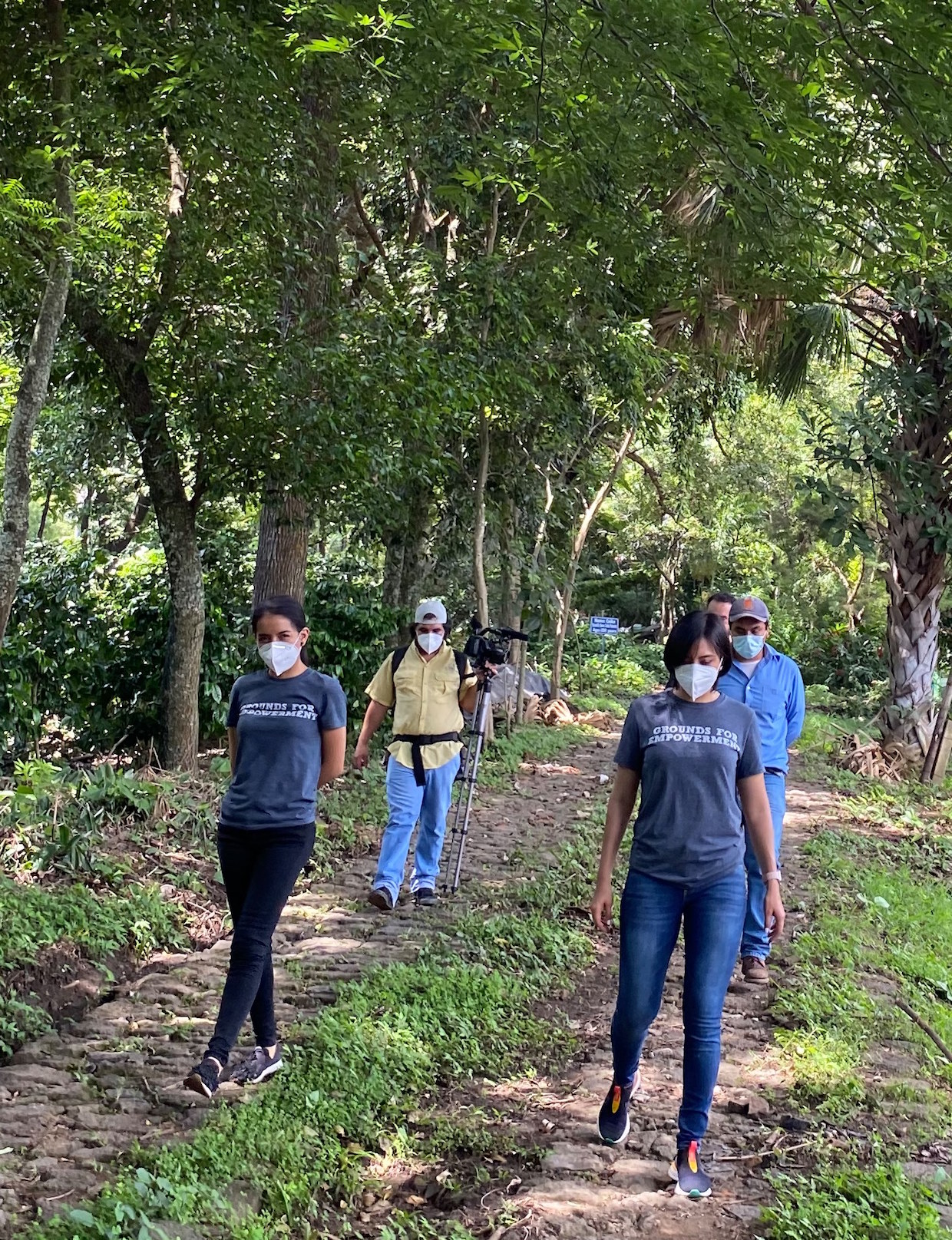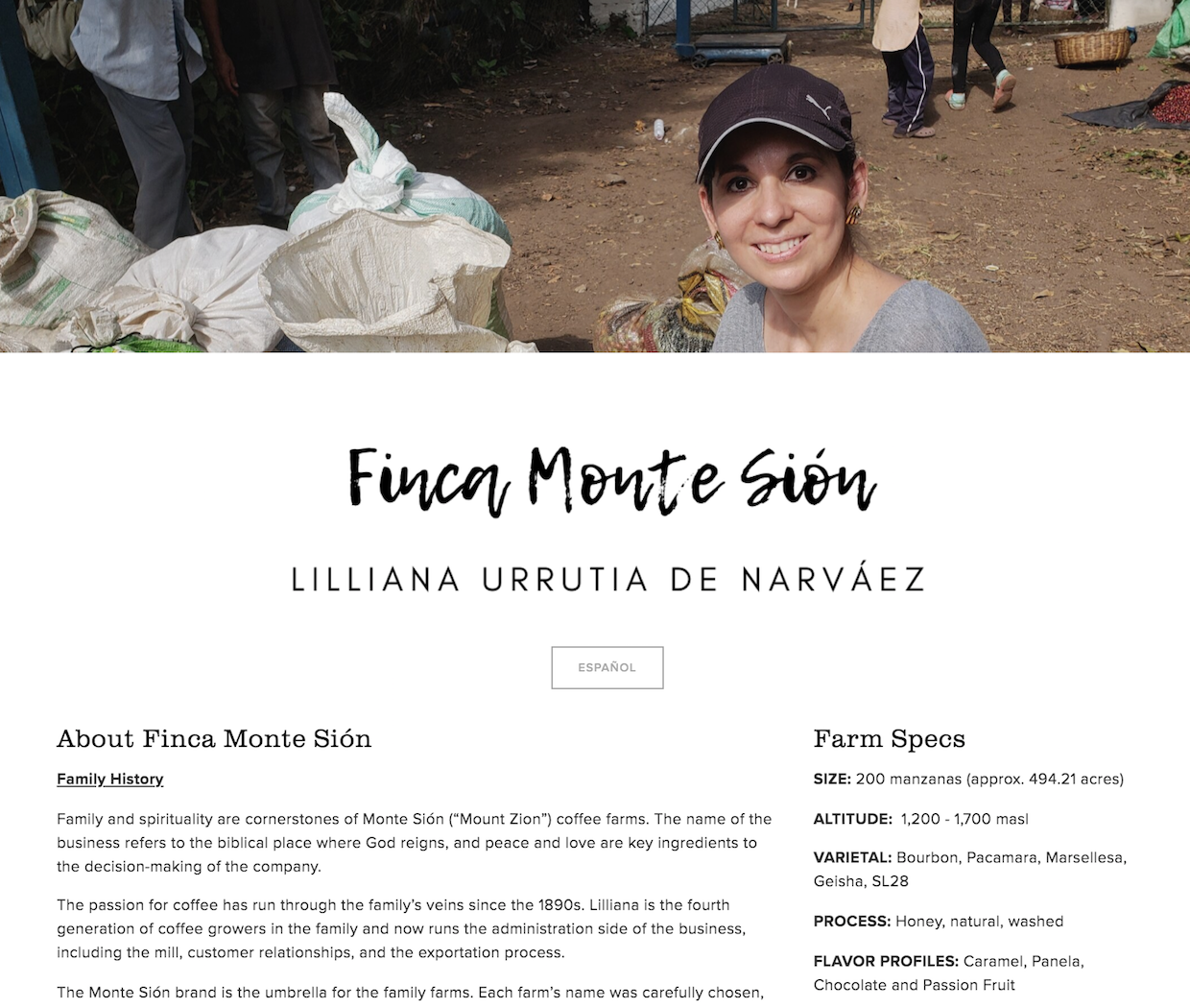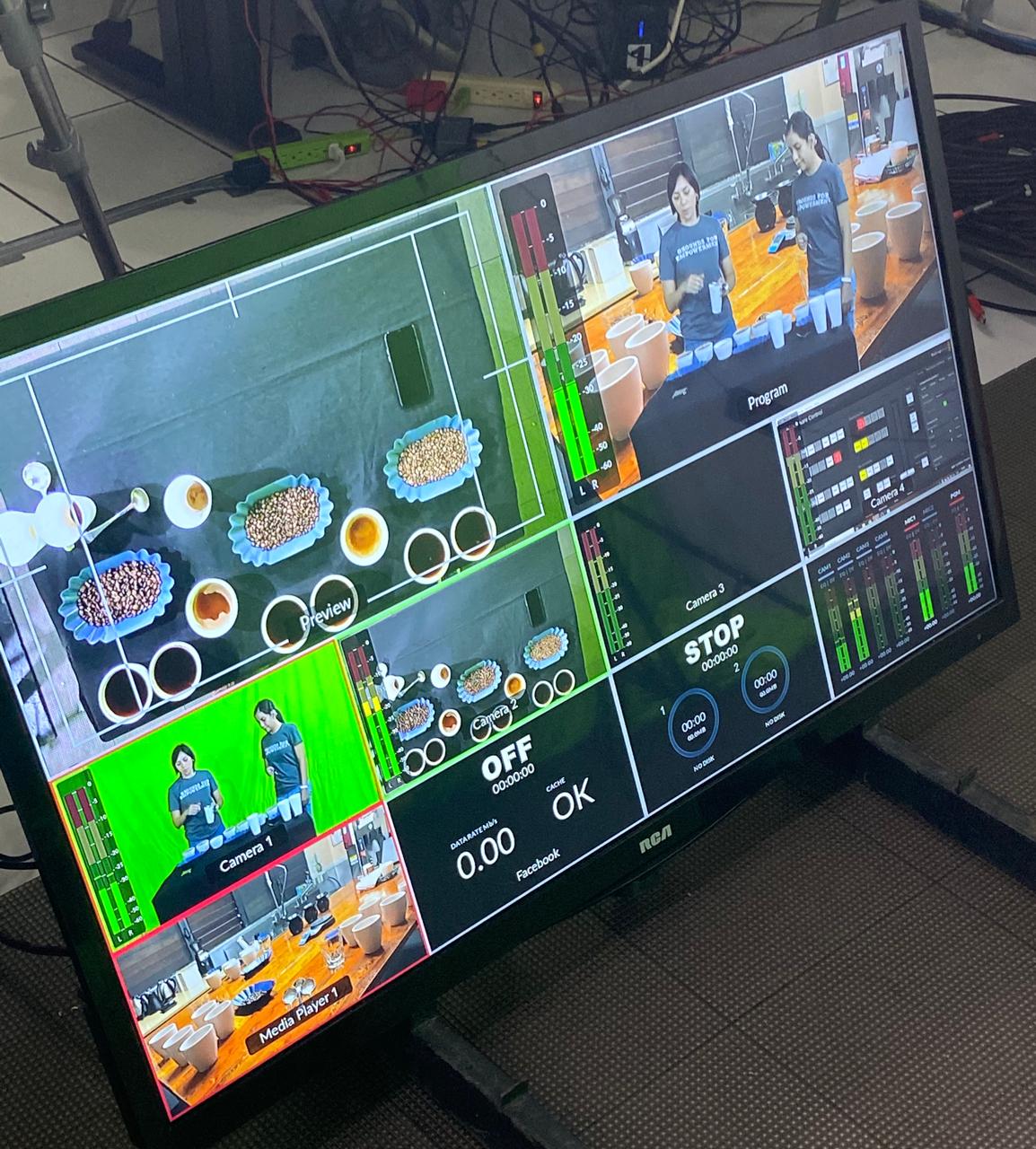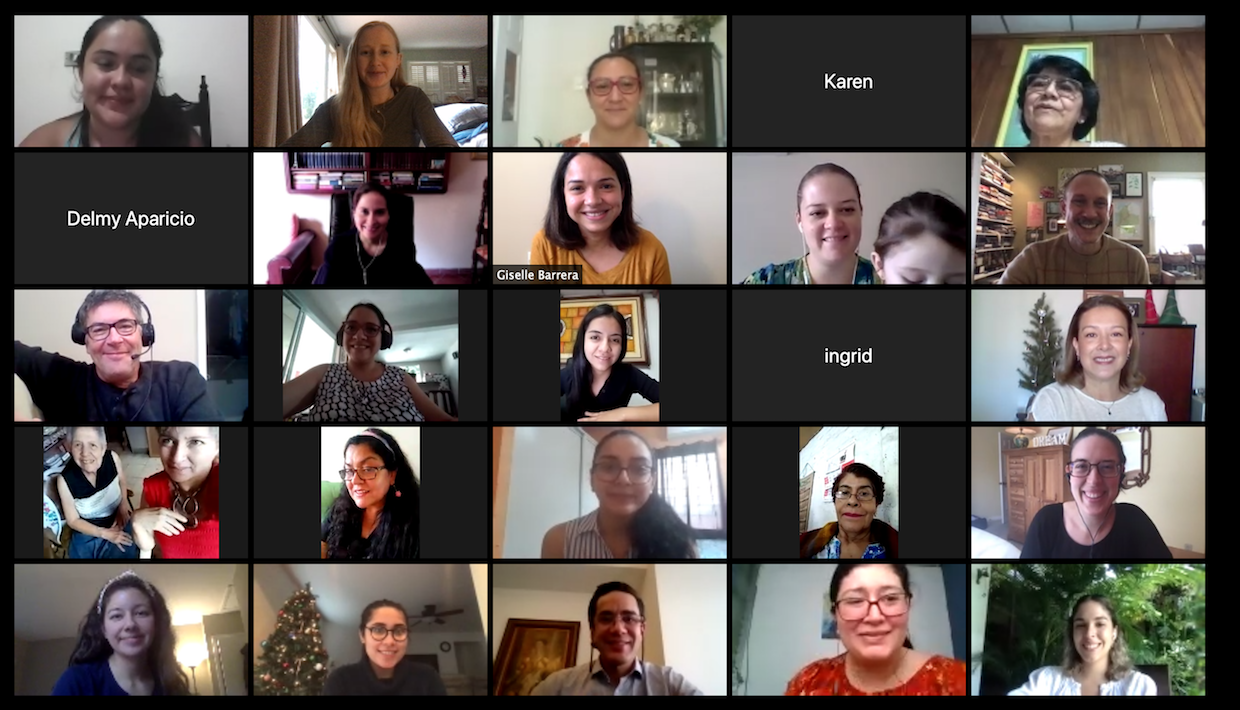
Mentors Gabriela Flores and Marjorie Canjura visit a coffee farm to record learning materials for participants of Grounds for Empowerment’s virtual workshop. Courtesy photo.
Most of the dollar value of coffee — as much as 90%, according to the 2018 Coffee Barometer — is captured in consuming countries.
To address this inequity in the expanding specialty coffee market, we must develop programs that empower farmers with the information, connections and business skills needed to capture a greater share of the value generated on their farms.
Working with partners like ANACAFE in Guatemala and IWCA in El Salvador, our nonprofit Grounds for Empowerment (GFE) initiative piloted business tools workshops in 2018, 2019, and early 2020. GFE is supported by the Social Enterprise @ Goizueta research center at Emory University, and is a companion initiative to the Specialty Coffee Transaction Guide.
These in-person GFE workshops, which were supported by trained university students and experienced industry mentors, focused on important topics like storytelling, financial tracking and business planning. They brought people together in the same room to share their experience and discuss ways in which farmers can command more control over their operations in order to gain traction in more premium markets.
Then came the pandemic.
While the demand for GFE Workshops remained strong, COVID-19 created challenges that required some serious changes this past year.
What did not change were the workshop’s core tenets: Specialty coffee farmers must be able to shape and control their own narrative when marketing their coffees, while also targeting that narrative to buyers; they must have the skills to track financial records to achieve specific income goals; and they must own their side of the transaction, including being familiar with the prices paid for similar coffees.
All that said, limits on global and in-country travel forced the GFE team to come up with a different delivery model for its workshops. On Dec. 4, 2020, we wrapped up our first 100% virtual “Business Tools Workshop” with 16 women specialty coffee farmers and can now reflect what we learned.

Screenshot. Once they graduate from the program, participants get a webpage on the Grounds for Empowerment site where they share their stories and technical information about their coffee farms.
We offer this insight for benefit of anyone attempting to forge and maintain deeper connections for a more resilient and sustainable coffee sector through virtual gatherings during the pandemic and beyond.
GFE Goes Virtual
Clearly, it was not feasible to mandate three consecutive days of intensive virtual programming. Screen fatigue is real, especially for people accustomed to working outdoors. In addition, the household obligations for women coffee farmers intensify as families spent time in full or partial lockdown. So, the GFE Workshop shifted from three consecutive in-person days to five consecutive Friday mornings over Zoom.

Caption: During videoconference sessions, workshop participants were encouraged to keep their cameras on, which resulted in increased interactions and better connections amongst the cohort.
To ensure that participants were ready for each session, weekly videos with welcome messages and learning materials were delivered in advance. We also reworked the critical cupping session. Because participants could not cup coffees together, we live-streamed a virtual cupping class that featured certified Q Graders from the GFE mentor network. Farmers asked questions about the cupping process while learning about the new protocols put in place by the Specialty Coffee Association (SCA). Each farmer also received a personalized report on her own coffee’s cupping score and profile.
Early concerns were not big problems
Over the summer, accessibility and interaction were our major concerns. GFE programs seek to build diverse cohorts of farmers from different regions and with different farm sizes. This ensures that participants benefit from networking opportunities with industry professionals and with each other.
In the end, the virtual program actually provided access to a broader pool of farmers. It was better for those who could not travel to a central location, and for women without easy access to childcare.
Because networking is such a key part of the GFE experience, we also worried about facilitating meaningful interactions. Unstructured “social hours” were embedded into the program, providing relaxed opportunities to connect and build community. We also monitored and paid attention to chemistry. When conversations slowed or when energy waned, students and mentors were ready to jump in to get things flowing again.
Silver Linings
In addition to providing better access for farmers, the virtual program model allowed for a broader pool of mentors with a broader range of perspectives.
“I really appreciated the opportunity to work with such a diverse group of mentors” said Gaby Flores, Certified Q Grader and GFE Mentor from El Salvador. “We worked with a team of mentors based in El Salvador, Honduras, Guatemala, the U.K. and the United States.”
The virtual model also allowed us to work with university students from several countries. GFE student teams are asked to provide critical support for participants as they develop stories, track finances, and make plans. In addition to working with students from Emory University, we were able to recruit students from Escuela Superior de Economia y Negocios (ESEN) in El Salvador.
“As we work to ensure that business school students understand the challenges that specialty coffee producers face, it is great to also see relationships form among students from Emory University and ESEN,” said GFE Academic Director Peter Roberts. “As these connections multiply, small specialty coffee farmers will have larger, more informed, and more diverse support networks.”

Without the option to host regular in-person cupping sessions, the Grounds for Empowerment team hosted a virtual cupping room where workshop participants could ask questions and get live feedback on the cupping scores of their coffees.
The virtual platform also facilitated alumni interactions across countries. One week after the close of the first virtual GFE workshop, our team hosted its first alumni Zoom meeting for farmers in both El Salvador and Guatemala. After introductions, we began planning a series of quarterly alumni meetings to discuss specific topics. These meetings will expand learning and networking opportunities, allowing farmers to share experiences, ideas, and market connections across different producing countries.
Lastly, importantly, a virtual program was more cost-effective due to the lack of travel, lodging and catering expenses.
Looking Ahead
Our team entered the summer of 2020 worried about future programming. Now, we are excited about addressing the next wave of challenges. A strong virtual program is economical and can be adapted to benefit more small specialty coffee farmers.
Having jumped headfirst into the virtual platform, we have identified some opportunities to further develop it with our partners on the ground.
We must keep improving. The first round of content was good, but it must get better. We are excited about leveraging a growing (virtual) student network to help generate more research insights that feed into the GFE workshops, and enhanced video materials to support the various sessions.
We must also embrace virtual relationship-building. The full value of the GFE experience will be realized as the team develops our virtual workshops into a viable and reliable virtual platform. This means investing in the program website and social media, and investing in virtual relationship-building forums that connect farmers with potential buyers.
We are proud that, despite the many global challenges, we were able to move forward with this virtual programming that develops important business skills and shares information with women specialty coffee producers. We are also excited that 2021 is off to a good start, as many applications from farmers for our Spring workshop in Guatemala are already coming in.
Giselle Barrera Carias and Chad Trewick
Giselle Barrera Carias is the Program Manager for Grounds for Empowerment (GFE). She lives in El Salvador and also leads the Latin America programs for Social Enterprise @ Goizueta. Chad Trewick has worked for more than 25 years in specialty coffee and now leads Reciprocafé LLC, a consultancy prioritizing mutual benefit throughout the coffee industry.








Comment